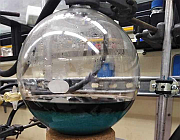Low valent bismuth complexes have gathered much attention especially since their high-lying, partially occupied p-orbitals have the right symmetry, energy and occupancy to promote bond activation events in small molecules. In this respect, they mimic the d-orbitals of transition metal (TM) complexes that have historically dominated catalysis but are often toxic and/or rare and expensive. Furthermore, the rich redox chemistry of bismuth as well as the availability of both one and two reversible electron processes means that facile redox cycling, crucial to catalysis, is achievable. All of the above, combined with bismuth’s low toxicity, low price and benign environmental nature, make low valent bismuth complexes appealing candidates for more sustainable catalytic technologies. The focus of this proposal was to prepare new well-defined Bi(II) complexes and consequently explore their reactivity with small molecules.

